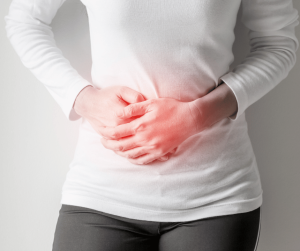
Poop & Weight Loss/Gain: How Your Bowel Health Impacts Your Scale
Your scale isn’t measuring fat — it’s measuring what your gut hasn’t let go of. Hidden stool retention, slow motility, and gut bacteria can quietly

Home » Understanding and Relieving Common Stomach Discomfort
Stomach discomfort is something we’ve all experienced at one point or another. Whether it’s that nagging bloat after a hearty meal, the burning sensation of heartburn, or the unpleasant feeling of constipation, digestive issues can disrupt our daily lives. In fact, it’s estimated that 74% of Americans live with digestive symptoms like diarrhea, gas, bloating, and abdominal pain. This makes it crucial to address stomach discomfort promptly and naturally, so we can get back to feeling our best.
Our digestive system plays a vital role in our overall health, affecting everything from energy levels to mood. Ignoring stomach issues can lead to more severe problems down the line. Fortunately, there are many natural and effective ways to alleviate these common discomforts. In this blog post, we’ll explore the most prevalent stomach discomfort issues, their causes, and simple strategies to find relief. Plus, we’ll introduce you to a fantastic tool that can support your digestive health: The PoopSTICK.
The PoopSTICK is designed to promote healthy bowel movements and ease constipation, making it a valuable addition to your wellness routine. But first, let’s dive into understanding the various types of stomach discomfort and what might be causing them.
Bloating is a feeling of fullness and tightness in the abdomen, often accompanied by visible swelling. It’s that uncomfortable sensation when your stomach feels stretched and full of gas, making your clothes feel tighter. Bloating can occur for various reasons, such as overeating, consuming carbonated drinks, or eating too quickly. Food intolerances, such as lactose or gluten intolerance, can also lead to bloating.
Constipation is characterized by infrequent bowel movements or difficulty passing stool. It can cause abdominal pain and discomfort, and the feeling of not completely emptying your bowels. Common causes of constipation include a diet low in fiber, inadequate fluid intake, and a sedentary lifestyle. Changes in routine, stress, and certain medications can also contribute to constipation. Ensuring regular, healthy bowel movements is essential for overall digestive health, and tools like The PoopSTICK can be particularly helpful.
Acid reflux occurs when stomach acid flows back into the esophagus, causing a burning sensation known as heartburn. This discomfort is often felt in the chest and can be mistaken for a heart attack. Common triggers include spicy or fatty foods, caffeine, alcohol, and lying down soon after eating. Overeating and obesity can also increase the risk of acid reflux. Managing diet and eating habits are crucial in reducing acid reflux episodes.
Diarrhea is characterized by loose, watery stools and an urgent need to use the bathroom. It can be caused by infections (viral, bacterial, or parasitic), food intolerances, or certain medications. Stress and anxiety can also contribute to digestive disturbances, leading to diarrhea. Hydration is vital when dealing with diarrhea to prevent dehydration and maintain electrolyte balance.
Stomach cramps are sudden, sharp pains in the abdomen that can be caused by various factors. Menstrual cramps, digestive disorders, food poisoning, and gas buildup are common culprits. Stomach cramps can be debilitating, making it challenging to go about daily activities. Identifying the underlying cause is key to finding effective relief.
Understanding these common stomach discomfort issues is the first step toward finding relief. In the next section, we’ll explore the primary causes of these discomforts and how they impact our digestive health.

Our diet plays a significant role in the health of our digestive system. Consuming processed foods high in sugar, unhealthy fats, and artificial additives can wreak havoc on our stomachs. These foods can slow down digestion, increase gas production, and lead to bloating and discomfort. Conversely, a balanced diet rich in fiber, fruits, vegetables, and whole grains promotes healthy digestion. Fiber helps to bulk up stool and promotes regular bowel movements, reducing the likelihood of constipation.
Adequate hydration is essential for digestive health. Water helps to soften stool, making it easier to pass and preventing constipation. Dehydration can lead to hard, dry stools that are difficult to eliminate, causing discomfort and straining during bowel movements. Drinking enough water throughout the day supports optimal digestive function and overall well-being.
Our daily habits and lifestyle choices significantly affect our digestion. Stress, for instance, can trigger digestive issues like acid reflux, diarrhea, and stomach cramps. When we’re stressed, our body goes into “fight or flight” mode, diverting blood away from the digestive system and slowing down digestion. Lack of sleep also impacts digestion, as it disrupts the balance of gut bacteria and affects the production of digestive enzymes. Moreover, a sedentary lifestyle can contribute to sluggish digestion and constipation. Regular physical activity helps to stimulate the muscles in the digestive tract, promoting healthy bowel movements.
Sometimes, stomach discomfort is a symptom of an underlying health condition. Common conditions that affect digestion include Irritable Bowel Syndrome (IBS), Crohn’s disease, and lactose intolerance. These conditions require specific dietary adjustments and, in some cases, medical intervention to manage symptoms effectively. Recognizing the signs of these conditions and seeking appropriate medical advice is crucial for maintaining digestive health.
By understanding the various causes of stomach discomfort, we can take proactive steps to address them and improve our digestive health. In the next section, we’ll delve into simple and effective ways to get fast relief from these common stomach issues.

Making mindful changes to your diet can significantly improve digestive health and provide relief from discomfort.
Staying hydrated is crucial for maintaining smooth digestive processes.
Incorporating gentle physical activities into your routine can stimulate digestion and provide relief from stomach discomfort.
Reducing stress can have a positive impact on your digestive health.
Several natural remedies can offer quick relief from stomach discomfort.
By incorporating these simple and effective strategies into your daily routine, you can find fast relief from common stomach discomforts and support long-term digestive health. In the next section, we’ll discuss preventive measures to maintain a healthy gut and avoid future digestive issues.

Maintaining a balanced diet is essential for long-term gut health.
Staying hydrated is a simple yet effective way to support digestive health.
Incorporating regular exercise into your routine can greatly benefit your digestive system.
Managing stress is crucial for maintaining a healthy digestive system.
By implementing these preventive measures, you can maintain a healthy gut and avoid future digestive issues. These habits support overall well-being and ensure your digestive system functions optimally.
Stomach discomfort can be a common and disruptive issue, but understanding its causes and finding effective relief methods can make a significant difference. By making dietary adjustments, staying hydrated, incorporating physical activity, managing stress, and utilizing natural remedies, you can alleviate common digestive issues and promote long-term gut health.
The PoopSTICK can be an excellent addition to your wellness routine, helping to support healthy bowel movements and ease constipation. Remember, a healthy digestive system is essential for overall well-being, so take proactive steps to nurture your gut health.
For more information and to explore how The PoopSTICK can enhance your digestive health naturally, visit www.thepoopstick.com.

Your scale isn’t measuring fat — it’s measuring what your gut hasn’t let go of. Hidden stool retention, slow motility, and gut bacteria can quietly

Your poop is a real-time report card on your gut health—and most people are ignoring it. From color changes to weird shapes to the clues

Wheat isn’t the villain—it’s the kind of wheat that’s wrecking your gut. From ancient grains to modern hybrids, discover how today’s wheat triggers inflammation, worsens

Your gut isn’t just digesting food—it’s controlling your hunger, energy, and even how fast you burn fat. Inside you is a powerful hormone called GLP-1,

Happy Poops.
What about your friends?